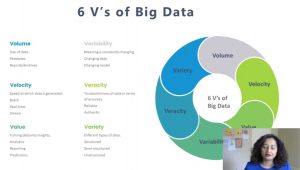An interesting session by Devshree Golecha, Head of Data and Analytics at TDEU, at AMEC Virtual Global Summit of Measurement on Communication Accountability: planning, purpose and proof: Day 1.
Some interesting facts first…
- The big data analytics market is set to reach $103 billion by 2023
- Poor data quality costs the US economy up to $3.1 trillion yearly
- In 2020, every person will generate 1.7 megabytes in just a second
- Internet users generate about 2.5 quintillion bytes of data each day
- 2% of organisations are investing in big data and AI
- Using big data, Netflix saves $1 billion per year on customer retention
I was fortunate to get an opportunity to attend the two-day AMEC Virtual Global Summit of Measurement on Communication Accountability: planning, purpose and proof. An immersive experience with some of the interesting global speakers sharing best practises on communication measurement and evaluation, including research, analysis and actionable insights took place on the 26-27 May 2021.
Though there were many interesting sessions by incredible seasoned communicators from across the globe, I have curated few and will share my learnings on some of those sessions shortly. In the first of the four that I plan to cover, I would like to highlight a session by Devshree Golecha, Head of Data and Analytics at TDEU on ‘Data Governance: Best Practices and key to data driven cultures’. Data crunching has always intrigued me and I was very keen to understand the processes to manage data effectively. While the presentation by Ms. Golecha covered the framework of data governance it also guided us with the process and nuances on establishing a data driven culture in an organization.
Studies show that 59% of the world’s population is using the internet (giving out data) but only 0.5% is utilized today (data is crunched), highlighting the fact that data is generated in high speed but it is not consumed in similar speed or done justice to the data that is available to us in the digital world to evaluate and leverage.
Ms. Golecha starts off with a very simple but a powerful quote by Albert Einstein ‘If you can’t explain it simply, you don’t understand it well enough’ – A crucial and apt anecdote I thought in data analysis.
Best Practices showcased for Data Governance:
Understanding Data Maturity terms
One pertinent question you might ask yourself -As per the Data Maturity terms, where are you placed-
Data Indifferent – Because decisions are rarely driven by data
Data Aware – Data is captured and read only for awareness purpose
Data Critical – Using data as an asset but only for business-critical areas
Data Driven – Organisations are thinking data first. Systems processes and people are working together to use data effectively and efficiently
Data to Action: How it should be done
How do you leverage the data to make strategic decisions, how can you get actionable insights from the data you have collected
Data –Analyzing –Target specific data needed to develop insights
Insights – understand the relationships, Develop the model, Solve the business problem
Actions – Change the way business is run to leverage the insights
 Its important to understand the 6 Vs of Big Data before getting into the framework of Big Data and the structure of data governance
Its important to understand the 6 Vs of Big Data before getting into the framework of Big Data and the structure of data governance
- Volume – how much, quantity of data
- Velocity – Speed at which it can be generated
- Value – How it is translated to insights
- Variability – Meaning of the data
- Veracity – Trustworthiness of the data
- Variety – structures, semi-structures, unstructured – different types of data
Big data value chain process
The entire Journey of data generation to data operations is determined by a strong data governance and data driven culture. The data journey starts from generation, identifying your sources, acquiring, understanding the content, extraction, analysis, visualization to monetization or to improve the operations of the business.
Best practice data management model
Foster data driven culture by educating and empowering business leaders with actionable data insights by focusing on 5 key areas: Transparency, Readability, Trackability, Actionability, Quality. Align the data strategy with our business priority. When all the content is put together and integrate them to create the asset. Further leveraging the data for strategic advantage and business need
Data Governance Framework
This framework focusses on policies, guidelines and standards (decisions on who can access the data, ownership of the data etc), data quality framework (six dimensions has to be met: accuracy, completeness, consistency, validitity, uniqueness and timeliness) stringent privacy compliance and security (customer information, addresses etc), information architecture (integrate all the information and storage), reporting and analytics (diligent reporting on analytics and data) supported by processes and tools and technology, people and culture, right set of skills and resources to support the governance framework.
AMEC which is in its 25th anniversary year, is the world’s largest media intelligence and insights professional body, representing organisations and practitioners who provide media evaluation and communication research. The International Association for Measurement and Evolution of Communication popularly known as AMEC has grown from 7 members to about 200 now representing organisations based in 86+ countries worldwide and more than 1000 professionals dedicated to measurement and evaluation best practice across the globe. AMEC’s pioneering work in the field has included the development of the Barcelona Principles; Barcelona Principles 2.0 and most recently 3.0 the launch of the AMEC Integrated Evaluation Framework and the Measurement Maturity Mapper.
*figures and data taken from the presentation shared by the speaker
The views and opinions published here belong to the author and do not necessarily reflect the views and opinions of the publisher.



Be the first to comment on "Data Governance: Best practices and key to data driven cultures"